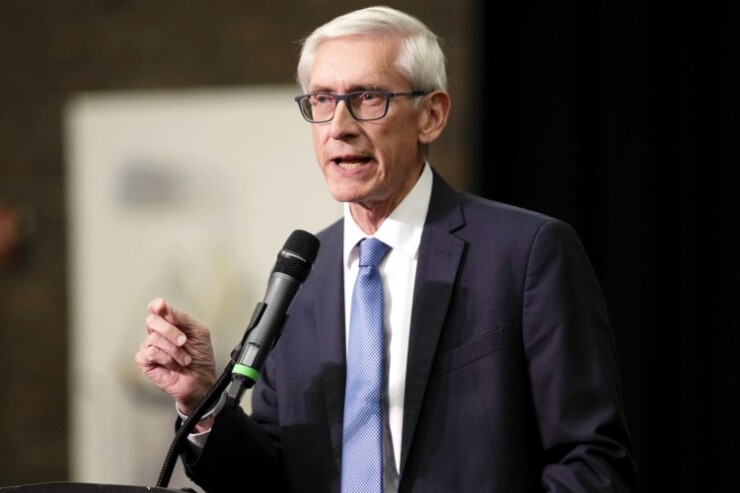Wisconsin entered the new fiscal biennium with a record $1.5 billion rainy day fund, positive GAAP balance and an approved budget that was signed a week later despite political battles between Democratic Gov. Tony Evers and the GOP-controlled legislature.
That’s the message capital finance director David Erdman is highlighting for rating agencies and investors.
“It’s a great situation to be in. I wasn’t sure we would get there,” Erdman said of the state’s budget stabilization fund, Erdman said.

In 2011, the general fund balance and budget reserve only held a combined $102.2 million, according to the Wisconsin Policy Forum. That was cited as a credit challenge.
Evers and the GOP battled over multiple pieces of the governor's proposed $91 billion budget with the GOP
The capital plan and $87.3 billion operating budget eventually approved by lawmakers at the end of June authorizes $1.67 billion of mostly general obligation backed new borrowing that will be completed in the coming years, Erdman said.
The new authority is far from the $3.6 billion that Evers wanted in GO and revenue-backed borrowing but in line with two years ago when the legislature approved $1.9 billion. The governor’s proposal was inflated by plans to issue $700 million over a 10-year period for the state’s stewardship program.
The University of Wisconsin system is the recipient of $574 million of the borrowing. Included in the authority is $125 million of GO bonding capacity to fund broadband grants.
Capital finance also has $2 billion of GO refunding authority “that will position us to consider and execute refunding transactions” as opportunities arise whether through current refundings, forward deliveries or taxable advance transactions, Erdman said. The state has saved $274 million in present value interest over the last two-and-a-half years from refundings.
The non-partisan Legislative Fiscal Bureau in June
Overall estimates for fiscal 2021 had risen by $1.6 billion and under statutory guidelines half — or $800 million — goes into the existing $762 million budget stabilization fund which serves as a rainy day fund bringing it to more than $1.5 billion.
The deposit puts the fund over a statutory cap tied to a percentage of expenses but because the existing balance hadn’t yet hit the cap, the full $800 million goes into the fund, Erdman said.
The boost to the ending balance and rainy day fund from the rosier revenue forecast through June 30, 2023 also benefits the
A building up of cash balances helped turn the state’s long tide of negative balances — $1.25 billion just two years ago — to a positive $1.5 million balance for fiscal 2020. Though modest, it marked a milestone for the state. The figure for fiscal 2021 was not yet available.
The Republican-controlled Joint Finance Committee’s budget version had also called for an additional $550 million deposit despite the cap, but Evers, a Democrat, vetoed the measure.
The latest tussle between the two sides played out last week when lawmakers convened to attempt an override Evers’ veto of a bill ending the $300 federal unemployment enhancement benefit which the GOP argues is contributing to a labor shortage. The GOP fell short of the needed votes.
Evers also called a special session for the same day to redirect of the $550 million of spending he vetoed to schools and other areas but the GOP rejected it.
While the budget raised education spending, Evers pushed for more but the GOP resisted saying schools were already set to benefit from their own $2.3 billion of new federal relief.
The state often heads into the new biennium without an approved budget because of political divisions, but a continuing appropriation in place allows the state to continue operating at previously approved levels. Evers early last month signed the package even though it fell short of his goals.
“At the end of the day, vetoing this budget in its entirety would have meant not only jeopardizing these investments but also likely causing our kids and our schools to lose $2.3 billion in federal funds when they need it the most,” Evers said.
The GOP included a $3.4 billion tax cut in the final budget. Evers used his veto to slice it down to a $2 billion income tax cut saying it would benefit “middle-class families at a time when our economy and families need it most.”
The GOP pushed back on Evers’ taking any credit for the tax rollback and noted how his original proposal would have raised taxes by $1 billion during the next budget cycle.
"Governor Tony Evers deserves no credit for signing our budget," Senate Majority Leader Devin LeMahieu, R-Oostburg, said in a statement. "This was not a bipartisan process of colleagues sharing ideas.”
The state’s GOs are rated AA-plus with a stable outlook by Fitch Ratings, AA-plus with a positive outlook by Kroll Bond Rating Agency, Aa1 and stable by Moody’s Investors Service, and AA and stable by S&P Global Ratings.





